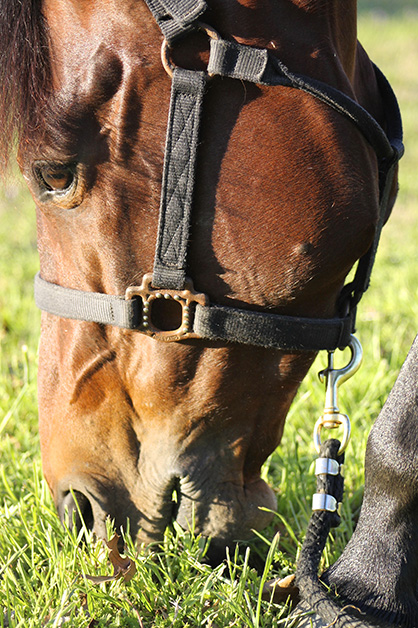4 Tips to Help Protect Your Horse From Ulcers
PHJ release by: Desiree Heath
APHA.com
The use of horses has changed drastically since they were first domesticated. Since those days, many aspects of horses’ jobs have changed, but the needs of their digestive system remains the same. APHA Corporate Partner Boehringer Ingelheim says APHA members can help provide their horses with the right nutrition and management to optimize their health and performance.
Horses are designed to continuously graze throughout the day; they also have relatively small stomachs compared to their body size, with only about a two- to four-gallon capacity. Because horses are natural grazers, they produce large amounts of saliva and need a continuous amount of roughage in their stomachs to create a protective wall from gastric acids.
Many performance horses’ schedules don’t permit a constant flow of food. As their training and work intensifies, their feeding schedules include meals of concentrates, like grain, that pass through the digestive system faster than roughage. That means they often lack a forage buffer that helps protect their stomachs from gastric acid and are therefore prone to ulcers.
Ways to combat gastric acid include:
- Allowing horses to graze freely whenever possible
- Using a slow-feed or grazing hay net
- Replacing calories from cereal grains with good quality roughage
- Adding alfalfa into a horse’s diet where appropriate
While these feeding methods can help, they don’t guarantee a buffer between the stomach and the acid.
“Horse owners have to consider the sheer amount of acid the horse’s stomach produces, and that acid is being produced whether there is food in the stomach or not,” said Hoyt Cheramie, D.V.M., MS, DACVS, senior equine professional service veterinarian for Boehringer Ingelheim. “The most natural way to feed a horse is to provide grazing for most of the day. However, that isn’t feasible for most performance horses that are fed large infrequent meals, have limited turnout and grazing, and are under the stress of training, showing and traveling; yet their stomachs still produce all of that gastric fluid on relatively empty stomachs.”
Altering feeding methods and introducing more roughage are great first steps in repairing your Paint horse’s digestive health, but adding in FDA-approved ULCERGARD® can add an extra layer of protection against ulcers during times of stress. Are ulcers already present in your Paint? Consider treating with GASTROGARD, the only FDA-approved equine gastric ulcer treatment, while adjusting your feeding methods. Knowledge and help from Boehringer Ingelheim will help you keep your special Paint in tip-top shape.
To learn more about Boehringer Ingelheim, visit boehringer-ingelheim.com.











